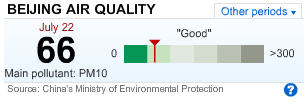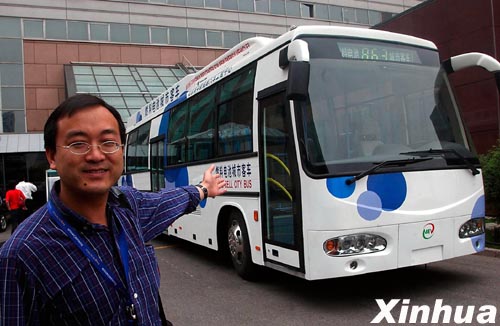Tue 22 Jul 2008
New traffic regulations part of Beijing’s effort for a Green “Blue Sky” Olympics
Posted by + mOdOk + under Currents , Life in Beijing , Sustainability , olympics
Beijing air quality was “good” today, but how about during the Olympics?
Drivers on Beijing’s roads are experiencing a pleasant development as roads are suddenly far less congested due to new traffic regulations that only allow drivers to take to the roads every other day according to whether they have an even or odd numbered plate. Of course, if you really want to drive every day this may not be a welcome development, but for the rest of us it is great! The measures are the latest of many efforts by the Beijing government to clean up the air for the Olympics. Blue Sky Olympics has been a highly touted catch phrase for years, and it seems they may get their wish after all.
Soon after being awarded the games in 2002, the Beijing municipal government and the Beijing Organizing Committee for the Games of the Olympiad (BOCOG) released an official action plan to meet World Health Organization requirements for concentrations of greenhouse gasses and particulate matter in the urban atmosphere and to reduce reliance on coal as a primary energy source. Pollution-free energies are expected to be the main fuels used during the Olympics, with solar-power fueling up to 90 percent of the street lamps and the heating of the bath water in the Olympic Village during the games.Solar, wind and geothermal power are also being used to power the Olympic Games.The energy mix readjustment plan called for the share of clean and efficient energy to account for over 80 percent of the final energy consumption mix.The aim has been for Beijing to showcase world top-level air quality during the Olympic Games. Judging from today’s weather, they may pull it off. Judging from a few weeks back, it would be a disaster.
Greening up a city the size of Beijing in such a short time frame has been no small feat. As Beijing continues its rapid growth, demand for energy continues to rise. Domestic supply has increased with the addition of a new gas-fired power generation plant, but the vast majority of Beijing’s energy needs must be met from outside, primarily from northern China. The Chinese central government and the Beijing municipal government have dictated that coal consumption absolutely must be reduced. There are currently several projects underway to boost Beijing’s natural gas production and storage capacity. Additionally, renewable energy technologies such as solar, geo-thermal, wind, bio-mass and hydro are actively promoted by the government. Alternative technologies for transport are also high in priority.
In its effort to clean up the air, the Beijing Municipal Environmental Protection Bureau has taken steps to reduce air pollution caused by industrial smoke from burning coal, and has not been averse to showing some teeth to get the message across. Last year, when inspectors noticed heavy black smoke pouring out of the chimney of Jingneng Thermo-electric Plant, they promptly shut the plant down for inspection, which revealed that an electric dust remover had broken down and hadn’t been replaced. As no moves to correct the problem were made until it was noticed by the inspectors, punitive measures were taken against the factory, signaling others major polluters that the local climate had definitely changed. The bureau then published a list of the 28 worst offenders in Beijing and also strengthened penalties on the illegal use of stove coal.
Air quality has been improving through the introduction of more energy efficient buses. The Beijing municipal government has renewed about 8,000 buses for the 2008 Olympic Games. The old black smoke spewing buses are now a distant bad memory, and the new buses are mighty comfortable indeed, especially the air conditioned ones! As part of Beijing’s effort to cut down fuel consumption and reduce emissions, 50 energy-efficient buses using hydraulic hybrid vehicle (HHV) technology have been experimentally operating on the streets of Beijing. HHVs incorporate special devices to absorb and deposit energy in the process of braking, and release the energy when the vehicles restart or accelerate, ideal for city buses which experience frequent braking and restarting. The hydraulic devices can be installed in nearly any vehicle without major modification of their structure or engine. It is hoped that the experimental HHV buses can reduce fuel consumption by greater than 30 percent and reduce 20 to 70 percent of greenhouse gas emissions.

Hydrogen fuel cell bus developed by Tsinghua University. Did I spot one on the streets today?!
The 2008 Olympic Games will also showcase energy-efficient hybrid electric vehicles, fuel cell vehicles, and pure electric vehicles. US-based General Motors has donated a zero-emissions electric bus for use during the Olympics. Visitors and residents of the Olympic Village will witness the demonstration of a new hydrogen technology in five buses that run on a mix of hydrogen and natural gas. In an interesting coincidence, I spotted an electric bus on the street in the Financial District today! Actually, i heard it first, as it made the distinct sound of an electric bus, but there were no overhead cables about, so I looked closely at the bus and noticed the EV label! While some may debate that as the bus is powered from the grid it doesn’t actually reduce GHG, it does improve air quality in the city. Of course, maybe the one I spotted today was powered by a hydrogen fuel cell!
In addition to efforts such as substituting natural gas, electricity and liquid petroleum gas for coal as a household heating and cooking fuel, shutting down coking ovens in big industrial plants and substituting natural gas for coal in some electricity and heating plants, city officials have actively encouraged installation of highly efficient natural gas-burning micro-turbine power generators that can provide cooling, heating and electricity for large buildings without drawing power from the grid.
Perhaps the greenest of all of the efforts by city planners are the various tree-planting projects throughout the capital and vicinity, including the ongoing development of a protective greenbelt separating north China from the surrounding desert which frequently sends dusty winds into the city. To date, the Capital Greening Commission, in cooperation with various departments of the Central Government and the National Forestation Commission, has planted thousands of trees.
The ongoing efforts to beautify the city are definitely appreciated! Beijing has also cleaned up over 40 kilometers of rivers for the event, and they are vastly improved indeed! Whatever feelings Beijing residents may have toward the Olympic Games themselves, reforms such as these surely come as a breath of fresh air.
One Response to “New traffic regulations part of Beijing’s effort for a Green “Blue Sky” Olympics”
Leave a Reply
You must be logged in to post a comment.
July 23rd, 2008 at 3:31 pm
Some experiment of the traffic regulation… I was driving on the 4th Ring Road on both Jul 16 and 23, at around the same time — 10 am. But today the jam was actually worse. I suppose that was because of an unoccupied Olympic Line (Time: 6am to 24pm).
The person in that picture is Mr. Qiu Bin. One of the nicest teachers in Tsinghua’s Dept. of Automotive Engineering. He was also in charge of class 41-44 — 89 students who enrolled in 2004. (In the end, 2 students dropped out, 2 had to postpone graduation; 1 transferred to the School of Chinese, one to Industrial Engineering; 2 new members came to study Automotive Body Design.) New graduates once did the exterior design (by PS, Coreldraw and Alias Auto Studio) for the Rendering class. I wonder if the selected one was adopted for the 863 bus…